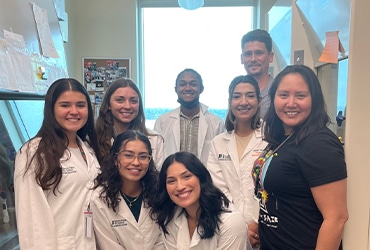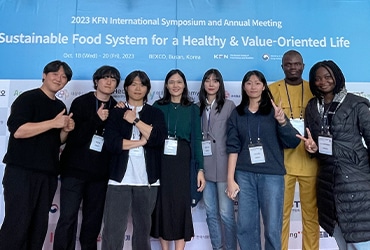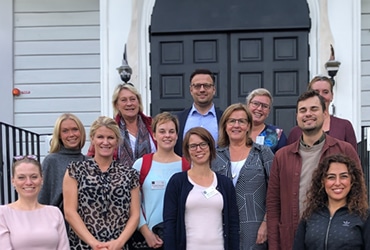From Biomarkers to Clinical Trials: A Decade Long Partnership Funds Innovative Research to Combat Ocular Melanoma
By Laura Romano, PhD
Uveal melanoma is the most common ocular cancer in adults, and although rare, is one of the most aggressive cancers and has poor long-term prognosis. Approximately half of patients with uveal melanoma will experience metastasis, typically to the liver, within ten years of diagnosis, a result that often proves to be fatal (1)
Just over ten years ago, the AACR and the Ocular Melanoma Foundation (OMF) began a partnership dedicated to funding research to find a cure for ocular melanoma. The ten-year history of the AACR-OMF Grants Program is a clear example of the power of partnership in combating cancer, which can be particularly impactful because rare diseases historically tend to receive less research funding. This partnership is working to address this unmet need through various grant mechanisms to support ocular melanoma researchers. Since its inception, the AACR-OMF Grants Program has awarded seven fellowships and career development awards that have generated invaluable scientific insight to combat ocular melanoma.
One area of research funded by the AACR-OMF Grants Program is identifying biological pathways underlying pathogenesis. Stefan Kurtenbach, PhD, was awarded the AACR-OMF Fellowship, in honor of Robert C. Allen, MD, in 2015 while a postdoctoral fellow at the University of Miami. Dr. Kurtenbach’s work focused on understanding how certain uveal mutations lead to increased metastatic spread, and in particular, his project investigated how neural crest guidance genes may lead to a migratory phenotype and contribute to metastasis. Dr. Kurtenbach shared that “this funding allowed me to initiate a new research path that was not covered by major grants of the laboratory at that time.”

In 2020, Anna Han, PhD, was awarded the same grant while she was a postdoctoral fellow at Thomas Jefferson University. Dr. Han’s research investigated the role of BRCA1-associated protein 1 (BAP1) in uveal melanoma metabolism and how mutant BAP1 re-programs metabolism in uveal melanoma. Dr. Han shared that when she began her fellowship, “cancer metabolism-related research in uveal melanoma was rare.” Dr. Han shared a similar sentiment as Dr. Kurtenbach, noting that despite exploring an uncharted territory in ocular melanoma research, “this grant allowed me to finish the research and publish three research articles and two review papers.”


In addition to understanding a disease’s fundamental biology, another key area of research is the identification of biomarkers. Biomarkers capture a specific aspect of an organism’s biological state at a given point in time, and are valuable for early screening, monitoring treatment response, or evaluating disease prognosis. For Alison Skalet, MD, PhD, her research in uveal melanoma led to the identification of a prognostic biomarker to better predict metastatic progression. Dr. Skalet, a faculty member at Oregon Health & Science University, was awarded the 2018 AACR-OMF Career Development Award for her work investigating circulating hybrid cells (CHCs) as a prognostic biomarker for uveal melanoma. “Research supported by my award led to the finding that in uveal melanoma patients, levels of CHCs detected in blood at the time of primary treatment predict metastatic progression and overall survival. This is exciting because currently a noninvasive prognostic biomarker for this cancer does not exist,” Dr. Skalet stated.

Many biomedical researchers hope that their work will create avenues for novel therapeutics to be translated into the clinic. Researchers funded through the AACR-OMF Grants Program have explored the use of different inhibitors to treat ocular/uveal melanoma. Jessica Teh, PhD, was awarded the 2016 AACR-OMF Fellowship while a postdoctoral fellow at Thomas Jefferson University for her work on combination therapies to overcome uveal melanoma drug resistance. Dr. Teh’s work identified metabolic adaptations to CDK4/6 plus MEK inhibitor combinations that could be overcome by an oxidative phosphorylation inhibitor. Dr. Teh now works as a translational scientist lead in oncology at Arvinas, and while thinking back on her trajectory into the biotechnology sector, she noted that “my postdoctoral training in a highly translational setting, with the help of AACR-OMF funding, has helped me prepare for this role.”

The following year, Vivian Chua, PhD, was awarded the 2017 AACR-OMF Fellowship, in honor of the Kammerman Family, while she was a postdoctoral fellow at Thomas Jefferson University. Dr. Chua’s research focused on bromodomain and extraterminal domain (BET) inhibitors, and she found a mechanism that promoted poor efficacy of BET inhibitors in metastatic ocular melanoma patients. Importantly, her work identified a combination therapy with the potential to mitigate this poor efficacy, a critical finding given the fatal role liver metastasis plays in ocular melanoma. Dr. Chua shared that she “received this award during the early stages of my postdoctoral training and career in ocular melanoma research,” and that receiving this award at such a critical time “helped build my career in ocular melanoma research, thereby allowing me to continue contributing towards this area.”

Extending past the laboratory, the AACR-OMF Grants Program has funded research in the clinical setting. Alexander Shoushtari, MD, was awarded the 2014 AACR-OMF Fellowship while an oncology fellow at Memorial Sloan Kettering Cancer Center. His project, “Overcoming resistance to MEK inhibition in advanced uveal melanoma,” was a phase II clinical trial to test therapeutic strategies to circumvent drug resistance in uveal melanoma. Dr. Shoushtari shared that “this grant was crucial in demonstrating that our ideas in pursuing rare melanomas were novel and interesting to the broader scientific community” and, moreover, that this award helped him continue his work studying rare melanoma subtypes.
In 2021, the AACR-OMF Career Development Award, in honor of Robert C. Allen, MD, was awarded to Roger Olofsson Bagge, MD, PhD, at the University of Gothenburg in Sweden. Dr. Olofsson Bagge’s project, “Isolated hepatic perfusion and immunotherapy for uveal melanoma metastasis – the SCANDIUM-II trial,” was a phase Ib/II clinical trial that highlighted the need for effective treatment strategies for uveal melanoma patients whose cancer metastasized to the liver. This clinical trial was funded in part by Dr. Olofsson Bagge’s AACR-OMF Career Development Award, and he noted the significance of this because “to be able to start and complete a clinical phase Ib/II trial, such as the SCANDIUM-II trial, is a major achievement, especially for a rare cancer disease.” Importantly, the results gathered from this clinical trial have led to the creation of a new clinical trial, the SCANDIUM-III trial, which will combine locoregional cancer treatment percutaneous hepatic perfusion with modern immunotherapy.

For the past decade, the AACR-OMF Grants Program has funded innovative research aimed at combating ocular melanoma. Novel biological pathways, biomarkers, therapeutics, and clinical trial results have been identified by AACR-OMF funded researchers. Moreover, these results have paved the way for ongoing studies that continue to advance the ocular melanoma field.
Reference:
- Kaliki S, Shields CL. Uveal melanoma: relatively rare but deadly cancer. Eye 2017;31:241-257. doi: 10.1038/eye.2016.275.